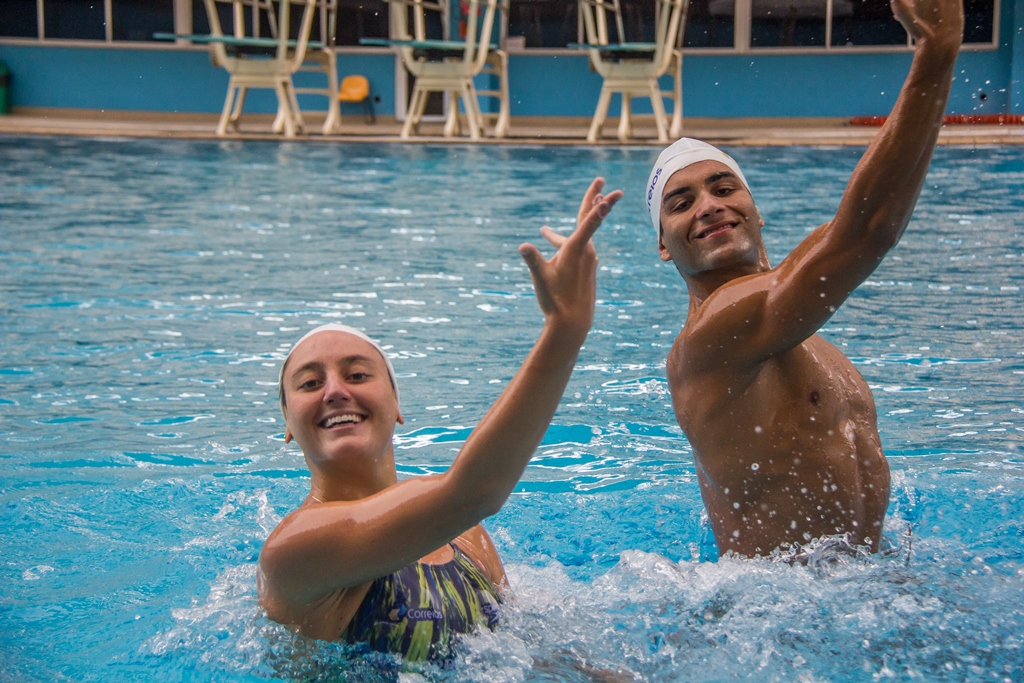What do biofortified crops and Brazilian Olympians Giovana Stephan and Renan Alcantara have in common? For one thing, both the crops and the athletes are known for their physical performance. For another, they are all concerned about healthy eating.
"I have eaten and love the biofortified vitamin A sweet potato. It is very sweet and soft, not to mention that it grows quickly,” says Giovana. “For me, I would love to try all biofortified foods, because an athlete must always invest in her diet. The quality of food we eat has an impact on our health and performance. That’s what biofortified foods are about.”
Giovana represented her country for ten years as part of the senior national team of synchronized swimming. One of her greatest achievements was becoming the first Brazilian synchonized swimmer to reach an individual final at the world championships, which occurred in Rome in 2009. She and Renan now compete as a mixed duet, with hopes that the event will be integrated into the Olympics by the 2020 Games in Tokyo.
Early this year, Giovana’s father Giuseppe Stephan received sample seeds of biofortified iron black beans (BRS Supremo) and vines of biofortified sweet potato to plant on his land in the city of Teresopolis, Rio de Janeiro. The crops soon caught the attention of Giovana and her partner Renan for their improved vitamin and mineral content.

"To perform well, we need very good nutrition, something that can come with the biofortified foods,” notes Renan. “Giovana and I always eat sweet potato; we have always carried it to training. Now it’s time to carry biofortified sweet potato."
Alcantara is impressed with the biofortification strategy in general, which seeks to reduce undernutrition—also known as hidden hunger—caused by lack of vitamins, minerals, and other essential micronutrients in the diet. Hidden hunger affects one in three people globally and is a major public health concern.
Giovana and Renan are not the only Brazilian sports personalities to embrace biofortified foods. Karina Lins e Silva, a former beach volleyball national champion and a member of the Organizing Committee for Rio 2016, is also an enthusiastic adopter of the crops. As a holder of a degree in nutrition and physical education, Karina sees the potential of biofortified crops to nourish and boost athletes.
"Many athletes rely on supplements but these can be expensive and some come with unintended side effects,” she observes. More natural options for improving nutrition, such as biofortified crops, can be appealing to athletes."
Karina and her mother have planted and consume biofortified crops, including sweet potato, corn, black and carioca beans.
"My mother tasted the biofortified vitamin A corn and loved its sweetness and its texture,” she says. “I found the biofortified sweet potato also very tasty and soft, with a flavor reminiscent of a pumpkin. My mother has been so impressed by the biofortified crops that now she even jokes about biofortifying our cattle,” Karina adds with a laugh.
“To perform well, we need very good nutrition, something that can come with the biofortified foods.”
Renan Alcantara, Brazilian Olympian
More About BioFORT Network
The biofortification projects in Brazil are managed by the BioFORT Network coordinated by Embrapa. Through partnerships with HarvestPlus and national agricultural research institutions, the Network uses conventional breeding techniques to select and increase the micronutrient content of the following crop varieties: rice, beans, sweet potatoes, cassava, maize, caupi beans, pumpkin, and wheat. New varieties of these crops are bred to contain higher levels of vitamin A, iron or zinc as a strategy to fight micronutrient deficiency, popularly referred to as hidden hunger. The BioFORT Network’s website contains the latest news and information on biofortification in Brazil.
